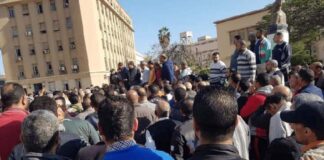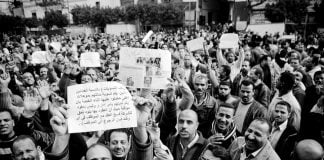A group of socialists in Zimbabwe face a possible death sentence for watching a video about the Egyptian Revolution.
Some 52 activists were charged with treason and “subverting a constitutionally elected government” in a Harare court yesterday (Wednesday).
The attack is part of a general clampdown organised by the dictatorship of Robert Mugabe in advance of possible elections later this year. He fears that the wave of uprisings in the Middle East and north Africa could spread south.
Police arrested the group on Saturday of last week following a raid on a meeting to discuss the implications of the Egyptian Revolution for Zimbabwe that was organised by the International Socialist Organization (ISO).
The accused were led into court on Wednesday hand cuffed and in leg irons.
Many had sustained injuries while in detention, and all—including those who are HIV positive—have been prevented from receiving medical attention and drugs.
One of those charged has only recently been discharged from hospital following brain surgery. Another detainee who broke her leg after being thrown down a two-storey stairwell during the raid is also being denied proper care.
State prosecutors allege that leading ISO activist and former opposition member of parliament, Munyaradzi Gwisai, and other participants at the video showing were planning to “organise, strategise and implement the removal of the consitutional government of Zimbabwe… the Egyptian way.”
Defence lawyer Alec Muchadehama said he has been denied access to the detainees since they were taken into custody.
Outrage at the arrests, torture and the charges is spreading across Africa and around the world.
Bongani Masuku of the 1.8 million-strong Congress of South African Trade Unions (Cosatu) has pledged the support of his organisation.
He said, “It is no doubt that the Egyptian and Tunisian experiences have inspired many workers and poor people all over the world to stand up and demand an end to dictatorship, corruption and injustice of whatever kind.
“The Cosatu condemns the continued persecution of political activists in Zimbabwe and the never improving situation in that country.
“The detention of about 52 activists of the International Socialist Organisation (ISO) in Harare on baseless charges of plotting to topple the government indicates the state of insecurity in that country.”
The Commonwealth Policy Studies Institute yesterday added its name to calls for “unconditional release” of those who have been jailed.
With stakes this high, activists in Zimbabwe are urgently calling on for statements of protest to be rushed to the addresses, phone and fax numbers below:
Send statements of protest to:
The Zimbabwe embassy in Australia: [email protected] and CC to [email protected] [email protected] and [email protected]
Also phone:
- Wayne Bvudzijena (police spokesman): +263 11 801 172 (mobile)
- Happyton Bonyongwe (Director of the Central Intelligence Organisation): +263 4 497 849 (home)
- Patrick Chinamasa (minister of “Justice”): +263 4 860 006 (home)
- President’s Office: +263 4 252 440 or +263 4 700 071
- Police Commisioner Augustine Chihuri: +263 4 250 008 (office) or +263 11 808 290 (mobile)
- Home Affairs (police) Minister Kembo Mohadi: +263 11 605 424 (mobile) or +263 4 794628 (office)
- State Security (CIO) Minister Didymus Mutasa: +263 11 200 532 (mobile) or 263 4 774189 (office)





